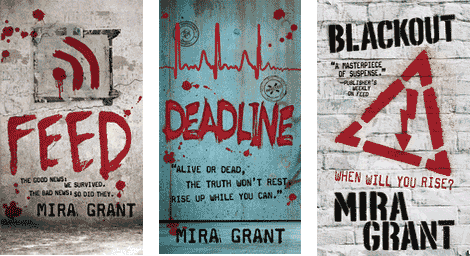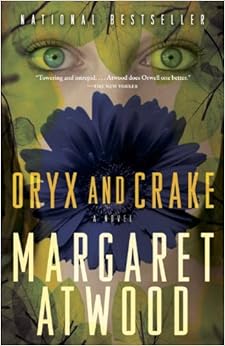No, this is not a list of reasons why you should start stocking up on canned goods. It's a list of (fictional) topics I LOVE to read about!
Obviously, I'm not alone. The popularity of books like World War Z, The Stand, Oryx and Crake, etc. is a testament to the fact that other readers are in this with me.
But...why? What is it about a post-apocalyptic novel that has me running to the library to get on the hold list? Why do so many of us love to steep ourselves in a world where, (let's be honest) if they became reality, we would likely be dead (or undead, considering)?
Let's mull that over, shall we?
1. WWYD?
Post-apolcalyptic storylines are completely immersive for me. It's impossible to read a book about life after the "end of the world" and not think, "Here's what I would have done in that crazy situation." I find myself planning out how I would have survived, how I would have saved my kids (and my husband, yeah, he can come too), where we could have holed up to avoid the zombie horde, etc. It's like a story within a story, as you always get a lot more to think about than just where the novel's plot is going.
2. There's safety in the outrageous.
You know what kinds of books keep me up at night? True crime. Stories of real-life serial killers, stalkers, rapists, etc. That's the stuff that makes me want to sleep with my high school softball bat under the pillow. But a plague that wipes out 99% of the world population? PSHAW. I can read about it, be entertained by it, imagine what I would do if it ever happened, but it won't really ever happen. That's the fun of it!
(Right?)
3. Top-notch world-building.
This is somewhat related to #1. Compared to many other genres, post-apocalyptic novelists usually have their world-building game on lock. Writing about a world after civilization is obliterated requires an author to think through a lot more than just what the survivors are eating and drinking. They have to consider the tiniest details of post-disaster resources, infrastructure, government, etc. and figure out how those details will impact their characters throughout the story. The amount of imagination and forethought this requires is staggering. Hats off to the authors who do it well!
Jump in here, readers. Why do YOU love (or loathe!) end-of-the-world literature? Or do you tend to love some of them and not others? Why or why not? I know I'm not the only morbid reader out there...

|
| Gratuitous Daryl Dixon photo for all of my Walking Dead fans. YOU'RE WELCOME. |













Kelly, I haven't read many books in this genre but I will say that I was very surprised at how much I enjoyed that aspect of Station Eleven; I might need to try some others and see what happens! Hope you have a great weekend!
ReplyYes, Station Eleven is a great example of this genre! I like it too because it is more of a "literary" fiction novel...not a lot of the campy-ness that you get from other dystopian works.
It's why I run, Zombies don't like fast food!
ReplyAGREED! I actually have an app called Zombies, Run that gives you "missions" to complete when you go out for daily runs...it even has a Chase setting that tracks your speed, and at random times during the run it tells you that the zombies are upon you, and you have to up your speed or else they eat you. Built in interval training! :)